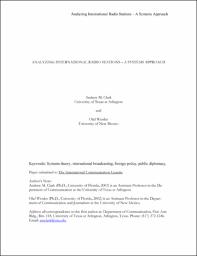
ATTENTION: The works hosted here are being migrated to a new repository that will consolidate resources, improve discoverability, and better show UTA's research impact on the global community. We will update authors as the migration progresses. Please see MavMatrix for more information.
Show simple item record
| dc.contributor.author | Clark, Andrew M. | |
| dc.contributor.author | Werder, Olaf | |
| dc.date.accessioned | 2021-05-28T19:49:31Z | |
| dc.date.available | 2021-05-28T19:49:31Z | |
| dc.date.issued | 2007-12-01 | |
| dc.identifier.issn | 1748-0493 | |
| dc.identifier.uri | http://hdl.handle.net/10106/29760 | |
| dc.description.abstract | **Please note that the full text is embargoed** ABSTRACT: For many years, international radio broadcasting has been used by nations around the world as a foreign policy tool. As the world political system changed following the end of the Cold War, so the importance of international radio broadcasting to some nations has changed. Although there has been some scholarly work devoted to international radio broadcasting, such work has focused mainly on the station and has neglected the system in which the station operates. This article uses systems theory and organizational communication principles to develop a framework for analyzing how and why nations are using international radio broadcasting. [This is an original manuscript / preprint of an article published by SAGE in International Communication Gazette in 2007. DOI: 10.1177/1748048507082840]. | en_US |
| dc.language.iso | en_US | en_US |
| dc.publisher | SAGE | en_US |
| dc.relation.ispartofseries | International Communication Gazette;Volume 69, Issue 6 | |
| dc.subject | Foreign policy | en_US |
| dc.subject | International broadcasting | en_US |
| dc.subject | Public diplomacy | en_US |
| dc.subject | Systems theory | en_US |
| dc.title | Analyzing International Radio Stations: A Systems Approach | en_US |
| dc.type | Article | en_US |
| dc.identifier.doi | 10.1177/1748048507082840 | |
Files in this item
- Name:
- Analyzing-International-Radio.pdf
- Size:
- 259.3Kb
- Format:
- PDF
- Description:
- PDF
This item appears in the following Collection(s)
Show simple item record


